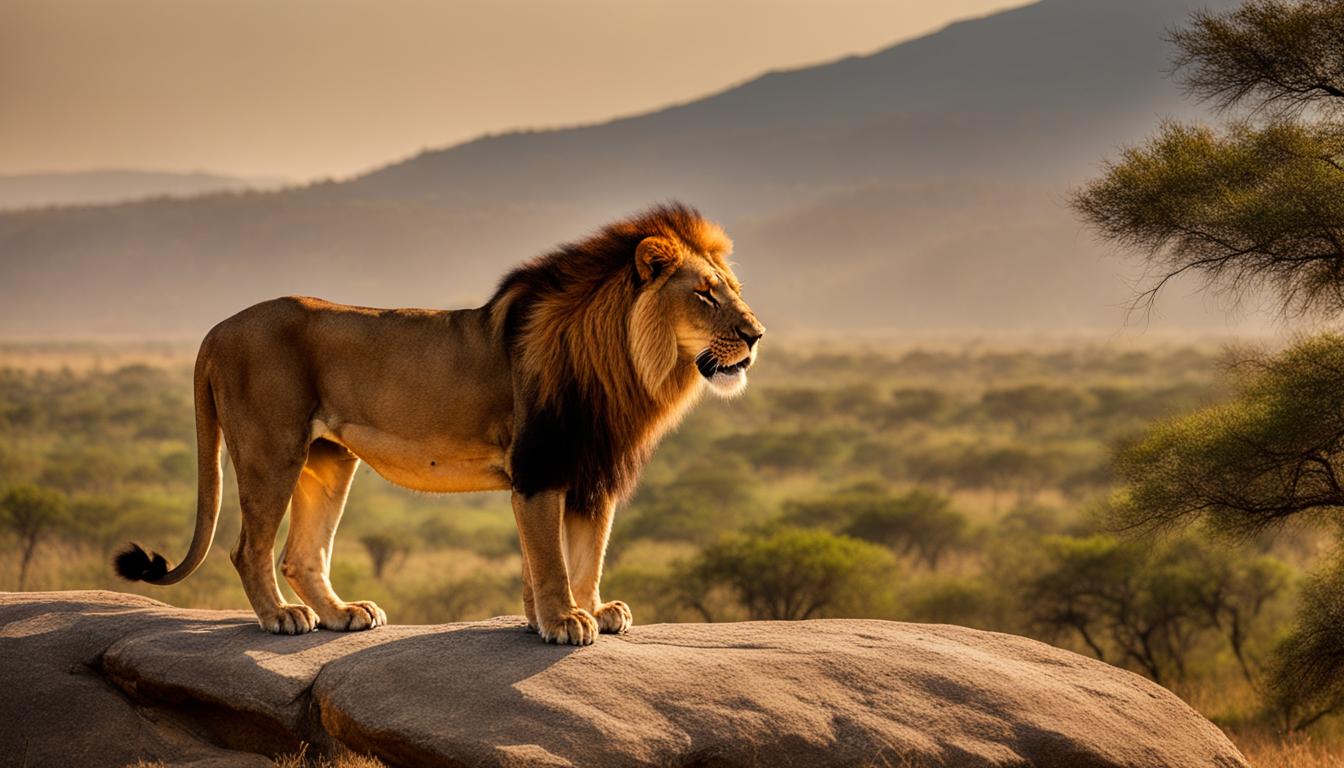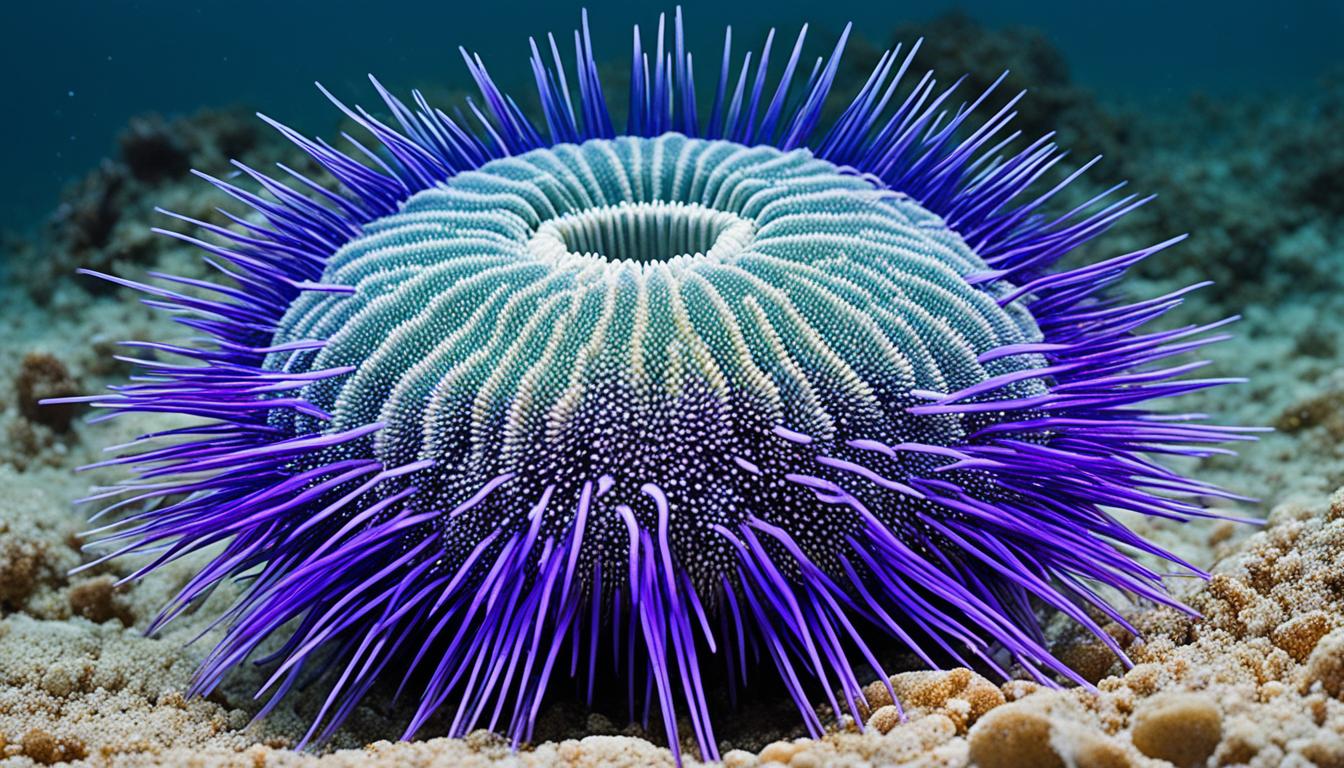Lions are fascinating creatures known for their powerful roars. Have you ever wondered why lions roar and how far the sound can carry? In this article, we will explore the reasons behind lion roaring and the impressive range of their vocalizations.
Key Takeaways:
- Lions are social animals that live in groups called prides.
- Their roars can be heard from up to five miles away.
- Lions use roaring to protect their territory and communicate with other lions.
- The power and tone of a lion’s roar reflect its strength and serve as a form of communication.
- Roaring is a key component of lion social behavior and territoriality.
The Power and Purpose of Lion Roars
Lions possess a remarkable ability to produce powerful roars that can be heard from miles away. These roars serve multiple purposes in the lives of these majestic creatures. Firstly, the power and tone of a lion’s roar help to distinguish it from other cats and communicate its strength. Lions use roaring as a means to ward off potential intruders and protect their territory and pride. The sound of a lion’s roar can reach up to 114 decibels, akin to the noise level of a chainsaw or snowmobile. It is a fearsome display of dominance that commands attention.
Roaring also plays a crucial role in lion communication. It enables lions to locate and communicate with other members of their pride, even from long distances. By roaring, lions can establish their presence, signal territorial boundaries, and gauge the strength of opposition from rival groups. In addition to roaring, lions employ various other sounds such as growls, moans, and gurgling growls that resemble purring to convey different messages.
Furthermore, lions utilize other forms of communication to mark their territory and display their abilities. They may scratch trees and leave scent markings with urine to leave a clear message for others. These behaviors serve as visual and olfactory cues, reinforcing their dominance and deterring potential challengers.
“The lion’s roar is not just a sound, but a symbol of power. It resonates through the African landscape, signifying the presence of this magnificent predator and instilling both fear and awe in the hearts of those who hear it.”
Lion Roars and Social Behavior
Lions are social animals that live in organized groups called prides. Roaring plays a crucial role in lion social behavior and territoriality. It serves as a means of communication among pride members, signaling territorial ownership, and defending against intruders.
One fascinating aspect of lion roaring is its use in locating distant pride members. Lions can recognize the roars of specific individuals within their pride, allowing them to communicate and coordinate their movements effectively.
Roaring is also a key element in establishing dominance and hierarchy within a pride. Male lions, also known as coalition leaders, use their powerful roars to assert their authority, ward off potential challengers, and protect their territories, which can encompass multiple female prides. The number of roars heard from rival groups can give the males an indication of the opposition’s strength, helping them strategize their territorial defense.
“Roaring is a primary mechanism of communication for lions, helping them to maintain social bonds within the pride and defend their territory,” says Dr. Jane Richardson, a wildlife researcher.
“The unique vocalizations of lions provide valuable insights into their complex social systems and contribute to our understanding of their behavior,”she adds.
Lion Roar Facts:
- Lions use roaring to communicate with other pride members and to locate distant individuals.
- Male lions roar to assert their dominance and ward off potential challengers.
- The number of roars heard from rival groups can give male lions an indication of the opposition’s strength.
- Roaring helps lions defend their territories and maintain social bonds within the pride.
Overall, lion roars are not only awe-inspiring sounds but also vital components of their social behavior. Through their powerful roars, lions establish their dominance, communicate with pride members, and defend their territories. Understanding the significance of lion roaring offers valuable insights into the complex world of these majestic creatures.
| Lion Roar Tattoo Ideas | Meaning |
|---|---|
| A roaring lion’s head | Strength and power |
| A lion roaring against a sunset backdrop | Courage and resilience |
| A lion’s roar with a crown | Royalty and leadership |
| A lion roaring with tribal patterns | Connection to ancestral roots and heritage |
Lion Roars from the Perspective of a Wildlife Enthusiast
As a wildlife enthusiast, there is nothing quite like the experience of hearing a lion’s roar echo through the African wilderness. It sends shivers down your spine and ignites a sense of awe and excitement within you. The power and intensity of a lion’s roar are truly unmatched, and it is a sound that will stay with you forever.
When camping in the midst of lion territory, the roar of these majestic creatures can be both exhilarating and humbling. Imagine lying in your tent, enveloped by the sounds of the night, when suddenly, a lion’s roar pierces through the darkness. It is a reminder of the untamed power of nature and your vulnerability in the presence of such magnificent beasts.
“The roar of a lion is the true voice of the wild – a symphony of strength and dominance that resonates deep within your soul.” – Wildlife Enthusiast
For those fortunate enough to capture this incredible experience on video, it becomes a cherished memory that can be relived and shared with others. Lion roar videos not only allow us to witness the raw power of these creatures but also serve as a reminder of the importance of conservation efforts to protect their habitats and ensure their continued existence in the wild.
So, if you ever have the opportunity to hear a lion’s roar firsthand, embrace the moment. Let the sound wash over you, and appreciate the privilege of being in the presence of these mighty kings of the savanna. It is an encounter you will never forget.
South Africa: A Destination to Experience Lion Roars
If you’re seeking an unforgettable encounter with the majestic roar of lions, South Africa’s Madikwe Game Reserve is the perfect destination for you. Imagine standing in the heart of the African wilderness, surrounded by the sights and sounds of untamed nature, when suddenly, the powerful roar of a lion reverberates through the air. The sheer intensity of the sound sends shivers down your spine, leaving you in awe of these magnificent creatures.
Madikwe Game Reserve offers a unique opportunity to witness lion roars firsthand. As you embark on a safari adventure, guided by experienced rangers, you’ll have the chance to explore the diverse landscapes of South Africa and encounter a variety of wildlife. Lions, with their commanding presence and thunderous roars, take center stage as one of the most captivating species in this thriving ecosystem.
While exploring the reserve, keep your ears attuned to the melodic calls of lions echoing through the wilderness. Their roars serve as territorial markers and communication signals to other lions in the area. It’s a mesmerizing experience to witness these powerful creatures assert their dominance and establish their presence within their pride.
For wildlife enthusiasts and nature lovers alike, a trip to South Africa provides an opportunity to immerse yourself in the natural wonders of the African savanna. The combination of breathtaking landscapes, diverse wildlife, and the awe-inspiring lion roars make it a destination that will leave an indelible mark on your soul.
Table: Comparison of Lion Roars in South Africa
| Lion Pride | Roar Intensity (Decibels) | Roar Frequency |
|---|---|---|
| Kalahari Pride | 110 dB | 5-10 roars per hour |
| Sabi Sands Pride | 112 dB | 12-15 roars per hour |
| Kruger National Park Pride | 114 dB | 15-20 roars per hour |
As depicted in the table above, lion roars can vary in intensity and frequency across different prides in South Africa. The roaring behavior of each pride reflects their unique social dynamics and territorial boundaries. These roars, with their power and significance, create an immersive experience that connects you to the primal essence of the African wilderness.
The Majestic Roar of the Lion
Lions’ roars are a defining feature of their behavior and communication. These powerful vocalizations serve various purposes in the lion kingdom. One of the primary functions of roaring is territorial marking, as lions use their roars to assert ownership of their domains and deter intruders.
Roaring also plays a crucial role in lion social systems. It allows lions to communicate with other members of their pride, enabling them to coordinate hunting strategies and locate one another in the vast African savannah. Lions’ exceptional ability to produce loud roars can be attributed to their large vocal folds, which allow for vocal vibrations at lower lung pressure.
Experiencing the power and majesty of a lion’s roar is an extraordinary encounter in the wild. The reverberation of their roars can create an adrenaline rush, making your heart skip a beat. It’s a thrilling moment that reminds you of the raw strength and dominance of these magnificent creatures.
Can Tigers Roar Like Lions, and Why Would They?
Tigers climbing trees: mysteries revealed. While tigers are known for their powerful roars, they do not typically roar like lions. Roaring is a unique vocalization specific to lions, serving to proclaim territory and intimidate rivals. Tigers, on the other hand, communicate through various vocalizations including growls, snarls, and hisses. With their distinctive roars, lions have evolved for social cohesion, whereas the solitary nature of tigers may not require such loud vocalizations.
FAQ
Why do lions roar, and how far can their roars be heard?
Lions roar for various reasons, including communication, territorial marking, and defense against intruders. Their roars can be heard from several kilometers away when conditions are optimal.
What is the power and purpose of lion roars?
Lion roars serve multiple purposes, such as warding off potential intruders, protecting territory and pride, and communicating with other lions. The power and tone of a lion’s roar help distinguish the cat from others and gauge its strength.
How do lion roars contribute to social behavior?
Roaring is a key component of lion social behavior and territoriality. Lions use roaring to signal their territory, locate distant pride members, and demonstrate ownership of territories. Roars also help lions defend against incoming males and communicate with other members of their pride.
What is it like to experience a lion’s roar as a wildlife enthusiast?
Hearing a lion’s roar can be a thrilling and awe-inspiring experience, especially when camping in close proximity to the animals. The roar of a lion is an iconic animal sound that leaves a lasting impression.
Is South Africa a destination to experience lion roars?
Yes, South Africa’s Madikwe Game Reserve is a popular destination to witness lion roars firsthand. The region offers diverse safari experiences and the opportunity to explore the complex communication and behavior of lions along with other thriving wildlife populations.
What makes the roar of a lion majestic?
Lions’ roars are a defining feature of their behavior and communication. Roaring serves various purposes, including territorial marking, communication with other lions, and distinguishing individual strength. Experiencing the power and majesty of a lion’s roar is a thrilling and memorable encounter in the wild.










